- Home
- Gail Godwin
Evenings at Five
Evenings at Five Read online
Evenings
at Five
Gail Godwin
With illustrations by Frances Halsband
Ballantine Books • New York
Table of Contents
Title Page
Dedication
Chapter 1
Chapter 2
Chapter 3
Chapter 4
Chapter 5
Chapter 6
Chapter 7
Chapter 8
Chapter 9
Chapter 10
Coda
Other Books by Gail Godwin
Copyright
For
Robert Starer
Vienna, Austria, January 8, 1924–
Woodstock, New York, April 22, 2001
Rudy’s chair
Chapter One
Five o’clock sharp. “Ponctualité est la politesse des rois”: Rudy quoting his late father, a factory owner (textiles) in Vienna before the Nazis came. The Pope’s phone call, followed by the grinding of the ice, a growling, workmanlike sound, a lot like Rudy’s own sound, compliments of the GE model Rudy had picked out fourteen years ago when they built this house. Gr-runnch, gr-runnch, grr-rr-runnch. (“And look! It even has this tray you pull down to mix the drinks.” Rudy retained the enthusiasms of childhood.) He built Christina’s drink with loving precision after the Pope’s call. Rudy did the high Polish voice, overlaid with an Italian accent: “Thees is John Paul. My cheeldren, eet is cocktail time.”
Or sometimes Christina’s study phone would not ring. Rudy simply emerged from his studio below and called brusquely up to her in his basso profundo: “Hello? The Pope just called. Are you ready for a drink?”
The ominous rolled r’s on the “ready” and “drink”: if you’re not, you’d better be. I won’t be here forever, you know.
The cavalier slosh of Bombay Sapphire (Rudy never measured) over the ice shards. The fssst as he loosened the seltzer cap and added the self-respecting splash that made her able to call it a gin and soda. Then, marching over to the sink: “I need Ralph.” Ralph was their best serrated knife. The thinly cut slice of lime oozed fresh juice. Rudy cut well; he cut his own music paper, and he had been cutting Christina’s hair exactly as she liked it for twenty-eight years. And in summer, a sprig of mint from the garden, a hairy, pungent variety given to them by the wife of a pianist who had recorded Rudy’s music. Sometimes Rudy joined Christina in the gin and soda. Her financial man from Buffalo had given them two twelve-ounce tumblers with old-fashioned ticker tapes etched into the surfaces. She always kept them in the freezer, so they would frost up as soon as they hit the air.
Other times Rudy would say, “I need a Scotch tonight.” That went into a different glass, a lovely cordial shape etched with grapes, given to him by the daughter of a pasha who had invited him to her houseboat parties in Cairo back in ’42 and called him Harpo because his assignment in the Royal Air Force had been playing piano and harp to keep up troop morale. “I need a Scotch tonight” could mean either that his work had gone extremely well or that some unwelcome aspect of reality (his music publisher sending back sloppily edited orchestra parts, being put on hold by his health insurance provider, being put on hold by anyone at all) had undermined his creative momentum.
“Thees is Il Papa calling from the Vatican. Cheeldren, eet is cocktail time.”
Christina was a cradle Episcopalian who had gone to a Catholic school run by a French order of nuns in North Carolina. Rudy was a nonpracticing Jew who had gone to a Catholic Gymnasium in Vienna until age fourteen, when the Nazis came. Rudy always liked to tell how there were two Jews and one Protestant in his class at the Gymnasium, “and the Protestant had the worst of it by far.” So Rudy and Christina shared an affectionate fascination with Popes, especially this one, with his hulking masculine shoulders before they began to stoop, and his nonstop traveling, and all the languages.
What did I think, that we had forever? Christina asked herself, sipping the gin and soda she now made for herself. Often Rudy had interrupted himself in midsentence to explode at her: “You’re not listening!”
What was I listening to? The ups and downs of my own day’s momentum. We were both “ah-tists,” as the real estate lady who sold us our first house pronounced it. She herself had been married to an ah-tist. Her husband’s novel had been runner-up for the Pulitzer, she told us, the year Anthony Adverse won. Her name was Odette, as in Swann’s downfall. Rudy was fifty-two and I was thirty-nine and neither of us knew, until Odette carefully explained it to us, that you could buy a house without having all the money to pay for it up front.
Christina would arrange herself on the black leather sofa they had splurged on in their midlife prosperity (a combined windfall of a bequest from Rudy’s late uncle in Lugano, with whom Rudy had played chess, and a lucrative two-book contract for Christina, in those bygone days when there were enough competing publishers to run up the auction bid) and which the Siamese cats had ruined within six months. She would cross her ankles on the Turkish cushions on top of the burled-wood coffee table and train her myopic gaze on Rudy’s long craggy face and familiar form reassuringly present in his Stickley armchair on the other side of the fireplace. An editor had once told Rudy he looked like “a happy Beckett.” Christina felt rich in her bounty: the workday was over and she had this powerful companion pulsing his attention at her, and her whole drink to go. They raised their cocktail glasses to each other.
Christina’s desk with ragged thesaurus and Rudy’s metronome
“So what did you do today?” She usually jumped in first, knowing he would tend to her novelist’s gripes or breakthroughs later.
“I finished the next movement of my piano sonata. If you like, I’ll play it for you later. Oh, and I had a call from Henning. He wants to conduct the choral version of Night Thoughts in Boston.”
“I didn’t know you had a choral version of Night Thoughts.”
“That’s because you don’t listen to me.”
“That’s not a fair statement. It’s just that I can’t keep track of all your works—”
“I keep track of yours.”
“Yeah, well, I only have ten novels and two story collections. You have hundreds of pieces. Please don’t ruin our evening. Tell me about Henning. That’s wonderful he wants to do it in Boston.”
“Yes. Maybe we’ll go if I’m still here.”
Rudy blew up quickly, but he blew over almost as quickly. Christina marinated her resentments, then simmered them over a low flame for days.
At other cocktail hours they would sit facing each other in silence on either side of the fireplace. (Two yards apart between his knees and hers: Christina had measured the distance after his death when she was wandering around taking inventories of all she missed about him.) They would sip their drinks and she would sigh and he would brood at her from under his eyebrows, until one of them asked: “What are you thinking?”
“I was thinking about my new book,” she might say. “It’s no good. I think it’s died on me.” And that might get them going for a whole evening, through a refill and then a bottle of wine with dinner, after which he would offer to read what she had so far. And she would creep upstairs and lie still in their bed and wait for his heavy tread on the stairs, and his shaggy head appearing round the door to say something like: “It’s magnificent, it’s going to be your best yet. But you’ve got to give Margaret a boyfriend—this is the twentieth century and she’s twenty-one years old.”
Or: “What are you thinking?” she would ask, breaking the silence first. Sometimes Rudy exploded with a tirade against toneless composers or a particular enemy. But most often he would look pensive and a little superior, as if he’d been called back from a place she couldn’t go.
&nb
sp; “I wasn’t thinking. I was hearing music.”
Freezer with gin reserves and ticker-tape glass
Chapter Two
The gin was flavored with not the usual one or two botanicals, but ten. Almonds and lemon peel, from Spain; licorice, from China; juniper berries and orris root, from Italy; angelica root, from Saxony; coriander seeds, from Morocco; cassia bark, from Indochina; cubeb berries, from Java; grains of paradise, from West Africa. International, like Rudy himself. Five nationalities, but he refused to claim the German one (“That was forced on us when Austria was invaded”). A gifted linguist, he spoke fluent German, Hebrew, English, Italian (“When I had my Fulbright, I wanted to see if I could learn a new language after forty; my teacher was pretty, she lived on the Piazza Mattei, across from the Fountain of Turtles”). He could get by socially in French when they traveled, and could erupt with impressive spurts of Russian and Arabic should the occasion arise.
He spoke a precise English, slightly British from his years in the Royal Air Force in Palestine. His foreign accent was not in the pronunciation of words but in his ornamental phrasings: even his recorded phone message danced with Rudy-ish melisma. He had a Shakespearean range of vocabulary and a richer command of American slang than Christina did. When a new situation called for it, he cobbled his own words: “the doctor removed two cancerettes from my face,” “Christina, you are turning into a curmudgeoness.” His after-lunch nap was his “tryst with Morphia,” who dyed her hair a straw blond and drove up each day from New Jersey. His tempo markings (“creepily,” “dreamily,” “elegantly,” “quite brittle,” “exploring,” “lackadaisical,” “amorous,” “relaxed with a bounce”) were drolly precise.
He loved spoonerisms and his were top quality, often resonating with prophetic aftertones. His favorite, “The Cope palled,” was a prime example. When the Pope stopped calling every evening at five, Christina’s religious life took a turn for the worse. She no longer found assurance in the familiar churchly trappings. None of them provided compensation or explanation for what she had lost.
The Cope indeed had palled.
She and Rudy had started their life together in a two-hundred-year-old rented farmhouse in an upstate New York village chartered by Queen Anne. They sat in two orange plastic lawn chairs in the living room and put their glasses and the bottle of sherry on the deep window seat between them, until their ancient landlady dropped in one evening and saw the state of things and sent down two armchairs and a coffee table. They drank Taylor’s New York State sherry in those frugal days when they had thrown over everything but their work in order to be together: Rudy had left his ordered family life in Manhattan, and Christina had given up her tenure-track teaching job in Iowa. Rudy rented a not-very-good piano from a local dealer, and Christina typed on a shaky table found for ten dollars at a local antique store. The sherry was followed by a cheap Spanish wine at dinner. On one special occasion, Rudy dropped a bottle of Mouton-Cadet on the paved driveway of the farmhouse as he was getting out of the car. The image of his woeful face (childlike in its despair) as he surveyed the smashed bottle was graven on Christina’s heart.
Now that Rudy was dead, Christina listened to him more closely than ever. There, the same two yards away from the cat-ravaged leather sofa (one of the cats had died young from heart failure), loomed his Stickley armchair. There was the tall Turkish pillow he used for propping up his back against chest pain. Only his kingly size was missing from the picture. The long face with the high forehead and thatch of white hair floated only in the gloaming of her memory.
But now, at the ghostly cocktail hours, she hung on his every echo. No need any longer for him to growl “You aren’t listening!” because Christina was. Intensely. She heard everything that decorated his silences: the oil burner kicking in, the refrigerator (making more ice), a southbound jet gaining altitude after its Albany takeoff. The click of the surviving cat’s toenails on the pine floors as he made his proprietary rounds.
“You are listening!” Rudy might now remark. And, always curious about her inner workings, he would want to know exactly what she heard.
View of below from Christina’s study
“I was hearing,” Christina spoke aloud to the empty chair, “something you might have said yourself. But first I have to tell you what led up to it. Remember, the last evening in your hospital room, you were sitting on the side of the bed, you were feeling much better, we expected they’d drain you and refuel you like the other times and send you home in a day or two. You’d finished your dinner, eating the whole salad with French dressing, picking at the meat sauce and leaving the pasta, drinking the black coffee and spurning the red Jell-O with Reddi-wip. You’d been telling me about a passage you liked in the Muriel Spark novel you were reading, where she says if you want to lose weight, eat and drink the same as always, only half, and then adds that this advice is included in the price of the book. ‘I liked that,’ you said. Then I said I thought I would skip church tomorrow and come to the hospital early, and we agreed I should get home before dark. And I stood up and kissed you and said in a jokey-flirtatious way, ‘Don’t you dare leave me.’ And you looked at me fiercely from under your shaggy brows and rumbled, ‘We still have some more time together,’ and I drove home reassured.
“Though of course we didn’t. Next morning, I had to be content with saying farewell to your body in the hospital bed. But here’s what I was hearing just now, in this voice I sometimes hear things. It’s a wiser version of my own voice, and it was saying like a mantra: ‘Absent in his presence, present in his absence.’
“And then I had this further idea. That somewhere in the gulf between those opposites, ‘absence and presence’ or ‘presence and absence,’ might lie the secret of eternal life.”
“Or the secret of death.”
Death had always fascinated Rudy far more than eternal life. Was that a Jewish thing?
“Or maybe,” Christina went on addressing the chair, “it’s all one and the same, only the order of opposites is reversed: absence in presence, or presence in absence. Depending on where you are on your journey.”
“Would you like a little more?”
Christina could still hear the pitch of Rudy’s voice asking this. Indulgent, protective, rumbly, but with no hint of a growl. What he was asking was: shall we continue this a little longer, this soul-to-soul cocktail hour we have built for ourselves over the years?
“Just a little, thank you.” The happy reply of drinkers all over the world.
Rudy’s ghost brought her the refill.
It was winter now and the wild wind screamed around the corners of the house they had built together in this Catskill hamlet fourteen years ago. “The Villa,” “The Factory,” or “The Orphanage,” they called it, depending on their mood. Rudy had dreamed up the first two names, and Christina had contributed the third after her mother died.
“You are with me always.” Christina continued talking to the chair, lifting the icy topped-off tumbler to her lips. “As in ‘Lo, I am with you, always.’ A strong personality comes into the world, touches some people, infuriates others, then goes out again. The absent one remains present to those people. Just as those people had their absent moments in his presence. Of course, nobody testified to all the times the disciples were fed up or bored out of their minds with Jesus. ‘Why is he making us walk so far in this heat? Who does he think he is, why does he go on and on and then yell at us for not listening, why does he have to have such a short fuse?’ “
And the wind whistled down the chimney, just like in the old stories.
In somebody else’s story, Christina thought, the wind would whistle down the chimney, she would look up one evening, she would focus, focus, focus on the shadows in the Stickley chair, and suddenly he would materialize, sitting bolt upright against his Turkish pillow to ward off chest pain. Dickens could toss off such a manifestation as easily as flipping a pancake, Henry James or Edith Wharton would finesse it with ambiguities, but this was Chri
stina’s story, and if she forced or finessed anything, she might miss the secret with her name on it.
Ralph the knife, with lime, mint, and ticker-tape glass
Chapter Three
Seven months had gone by. On the day of Rudy’s April funeral some Jewish friends had given her a yahrzeit candle, to keep lit for the seven days of shiva. Now it was November and she took the empty red glass container with the Star of David to the local candle store and asked if it could be refilled and a new wick put in. No problem, they said.
The young rabbi who had conducted Rudy’s funeral and burial with imagination and aplomb turned out to be a Jewish mystic. She told Christina that she would come every afternoon at five and sit shiva with her and help with the guests. And on the seventh evening, if Christina so desired, the rabbi would be glad to walk around the outside of the house with her and help dispatch Rudy’s spirit on its transmigratory journey and then cook dinner for her. Christina said she was not ready to dispatch Rudy’s spirit and that she thought she would like to be alone on the seventh evening. The rabbi took it sportingly and continued to show up at five each afternoon in her chic and original outfits. Trim little tweed suits with midcalf skirts, dashing scarves cleverly knotted, colored socks that matched her Guatemalan pillbox hats that served as feminine yarmulkes. She was tiny with long, slim feet, and wore different pairs of hand-sewn Italian lace-ups greatly admired by Christina and the friends who came to the shiva-salons for Rudy. The rabbi didn’t proselytize, but shared her mystical lore if asked. She was a great asset at the five o’clock gatherings: artfully told first-person ghost stories are always a draw, and the rabbi told them well—how she finally had persuaded her beloved great-uncle to leave her kitchen on the fifth anniversary of his death, arranged a little ceremony, then opened a window and felt his unbound spirit take off like a freed hawk into the night. The dead little girl who had to instruct her mother through a dream that it was time to let go. Plus some Kabbalistic timetables of the spirit’s itinerary, how long it lingers where, especially in the first year after death.

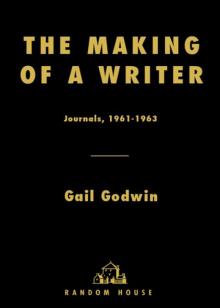 The Making of a Writer
The Making of a Writer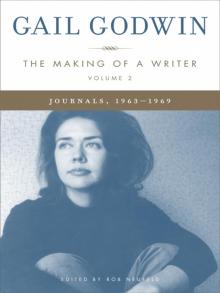 The Making of a Writer, Volume 2
The Making of a Writer, Volume 2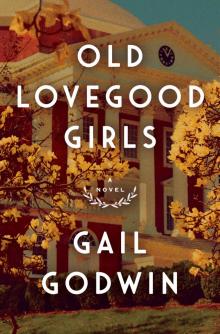 Old Lovegood Girls
Old Lovegood Girls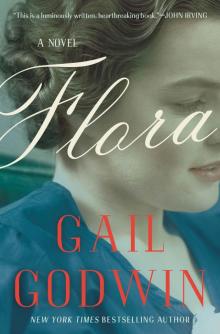 Flora
Flora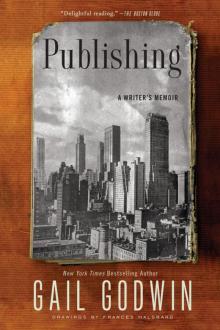 Publishing
Publishing The Finishing School
The Finishing School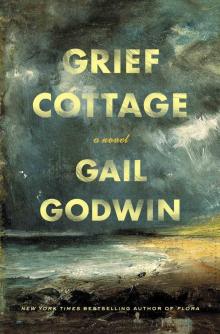 Grief Cottage
Grief Cottage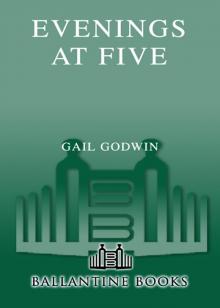 Evenings at Five
Evenings at Five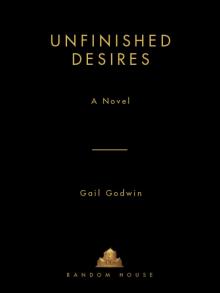 Unfinished Desires
Unfinished Desires